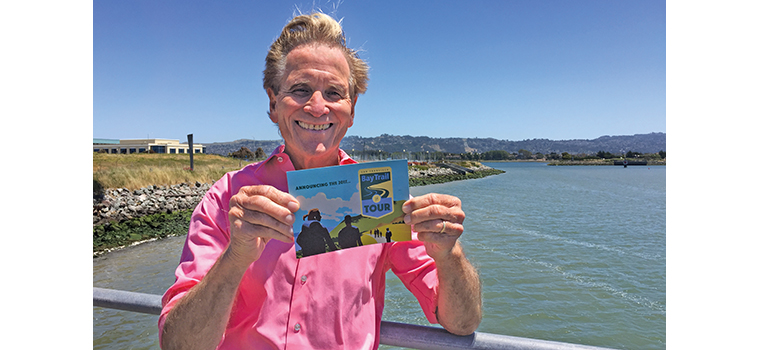Now you can take along popular local TV host and outdoor enthusiast Doug McConnell when you're exploring the San Francisco Bay Trail.

“The Bay Trail on Tour” is a collection of a dozen free smartphone audio tours keyed to walking segments of the Bay Trail and narrated by local TV host Doug McConnell. Photo by Annie Burke
BC STAFF REPORT
Published: June, 2017
Now you can take along popular local TV host and outdoor enthusiast Doug McConnell when you’re exploring the San Francisco Bay Trail.
The folks behind the Bay Trail are inviting the public to download and enjoy “The Bay Trail on Tour”—a collection of a dozen free smartphone audio tours keyed to walking segments of the Bay Trail and narrated by the charismatic McConnell. “The Bay Trail on Tour” uses app technology to make the ring-the-Bay bike and pedestrian path accessible to more people.
“‘The Bay Trail on Tour’ enables people of all ages to get out on the Bay Trail and hear stories about amazing places right in our backyard,” said Laura Thompson, project manager for the San Francisco Bay Trail. “The Bay Trail is hundreds of miles long and has thousands of stories to tell about history, culture and nature. We have uncovered a great collection of stories with these 12 tours.”
To participate, residents and visitors can download the free Vizzit Places app (available for iOS and Android), then walk and listen to the 12 audio tours hosted by McConnell. Driven by GPS technology, the app detects where the walker is at any given moment and delivers site-specific content.
“’The Bay Trail on Tour’ is the Bay Area at its best,” said McConnell, host of OpenRoad on NBC Bay Area. “Whether you live in the Bay Area, or you’re just visiting, with your smart phone and good walking shoes you can get to know this place while spending time outside.”
The featured hikes range from two miles to five miles, with the narrated tours lasting from one to three hours. One of the shorter hikes explores wetlands that were once part of the Hamilton Air Field in Novato, while the longest showcases recently restored wetlands at Sears Point in Sonoma County. Other areas covered include Alviso in San Jose, Bair Island in Redwood City, the shoreline in Sunnyvale and the first stretch of the Bay Trail ever built, which is in Hayward.
Eleven audio tours were funded by the California Coastal Conservancy, a state agency that aims to protect and restore the California coast and connect people to the coast’s natural resources. The “Shoreline at Mountain View” tour was made possible through a sponsorship from Google’s Real Estate & Workplace Services organization.
“We are always looking for ways to connect Californians to their shoreline,” said Matt Gerhart, Bay Area program manager at the Coastal Conservancy. “Innovative technology is a great, creative way to encourage people to get outside and explore.”
Vizzit Places, an East Bay company, worked closely with local historians, shoreline managers and scientists to develop the tours. “There is so much to know about the Bay Area, and with ‘The Bay Trail on Tour’ you have an on-demand tour guide. Go for a walk and learn about the place, all from the convenience of your smart phone,” said Arthur Bart-Williams, CEO of Vizzit Places.
The details and locations of “The Bay Trail on Tour” audio tours can be found at baytrail.org/get-on-the-trail/audio-tours.
The audio tours complement the Bay Trail’s handsome boxed map set, which is on sale at local bookstores (including the Bay Crossings store in the Ferry Building) and online at store.abag.ca.gov. There are currently more than 350 miles of Bay Trail in place throughout the nine Bay Area counties. The new app aims to raise awareness about the San Francisco Bay Trail and the efforts to close the remaining gaps in what will someday be a 500-mile continuous shoreline trail.
MTC currently supports planning for the Bay Trail with more than $700,000 a year in bridge toll funding. Since the Bay Trail’s inception in 1989, MTC has allocated more than $8.6 million to the project for development of the network.

